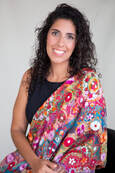|
There seems to come a point in our lives when we are posed with a question as to whether we should pass along information to people that we love. Is it our responsibility to “protect” someone from the truth? I remember when I was a teenager and my good friend was madly in love with a girl. The girl happened to be dating his best friend (unbeknownst to him). I had the information and I was unsure what the right thing to do was; tell him or let him continue on his delusional path. In the end, the decision was taken out of my hands. I shared the information with one of his other friends, who quickly called him up and told him the ugly truth. When he found out, he was devastated and he called me sobbing. At the time I wasn’t sure if I had done the right thing. I wondered if it was better that he found out sooner rather than later.
With children we are often protective as to what to tell them and what not to tell them. But I struggle with this as well, because I know full well that my children, and yours, know much more than we believe they do. So, when we are withholding information usually they know it anyway. When my husband and I decided we were separating, we didn’t tell anyone for a while. We decided in March, but didn’t share the decision with people for a while, especially the children. Yet, we could both tell that Eddie our 2 year old sensed something was wrong-so much so that I said to him, “I know you are feeling sad and you are not sure why, but you are right something is wrong and we are going to make it better”. Once I acknowledged his feelings, his crying stopped and he sat on my lap and we hugged each other. I was at a course in Manhattan over a weekend, and there was a man there, who was observant of the Sabbath which meant that he was prohibited from using electricity. During lunch on Saturday, rather than going out to the restaurant with the rest of the members, he sat alone in the training room in the dark. I turned to the non-Jewish woman, who rents out the space, and said to her, “he won’t ask you, but maybe you could turn on the light for him.” My friend overheard our conversation and asked us if our desire to help, was coming from a place of helping or controlling. If we are imposing our beliefs about what someone might want without asking them, we are in essence taking their control away. Who are we to do that? On Saturday, my wonderful Great Aunt passed away and again we were faced with the question to tell or not to tell. My Grandmother is a vibrant, loving, fun-spirited woman who loved her sister very much. My Grandmother, my parents, my sister and I attended a family wedding in upstate New York over the weekend. The party went on till late into Saturday night and on Sunday morning we all trudged wearily into the hotel dining room for breakfast. Thank you’s and congratulations were being thrown around the room as we all prepared to pack up and leave for home. In all of the excitement none of us checked our cell phones. So, when we finally got the message, it was 24 hours since she had passed and my mother and I had the following conversation; “When are you going to tell her? now or after the 5 hour drive home?” “ I am going to tell her now. she passed away yesterday. If I don’t tell her, she will call home and find out.” “ Mom , maybe you should wait till you get home so that she doesn’t have to sit in the car with that sadness.” And then I stopped to think about it. Who am I to control someone else’s grieving process? Why do we believe that once a person turns a certain age, it is our responsibility to protect them? What gives me the right to “protect” anyone? When I say that I am trying to protect you, what am I really saying? Am I saying that you can’t handle it? That I am stronger than you? When I am protecting you, am I taking away your power? What gives me the right to decide how you deal with something?
0 Comments
|
Rabbi Esther AzarArchives
May 2020
Categories
All
|

 RSS Feed
RSS Feed
